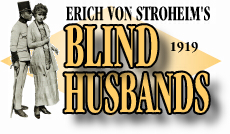

Universal
Cast: Erich Von Stroheim (Lt. Eric Von Steuben), Sam De Grasse (Dr. Armstrong), Francelia Billington (Mrs. Armstrong), T.H. Gibson-Gowland (Silent Sepp, the mountain guide), Fay Holderness (the waitress), Ruby Kendrick (a village blossom), Valerie Germonprez and Jack Perrin (honeymooners), Richard Cummings (the village physician), Louis Fitzroy (the village priest), William Duvalle, Jack Mathes and Percy Challenger (three men from "home")
Dr. Armstrong and his wife vacation at an Alpine inn so
Armstrong can climb the Pinnacle with the help of his friend and
local mountain guide Silent Sepp. Arriving with them is Austrian
officer Lt. Von Steuben who is taken with Mrs. Armstrong. He constantly
appears at her side and attempts to win her over with his attentions
while Dr. Armstrong seems to be too preoccupied with other things
to notice or give proper attention to his wife. One day, while
Dr. Armstrong is out, Von 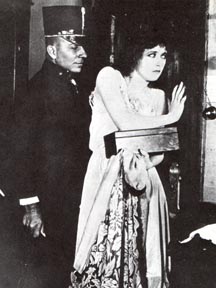 Steuben
brings a gift to Mrs. Armstrong's door that she admired at a shop.
Not being completely dressed, she opens the door only enough to
receive the gift. However, they hear someone coming, and she allows
him to come into he room to avoid being seen. He pursues her aggressively,
and the only way she can get him to leave is to promise to give
in to him at a later time. This opportunity comes at a mountain
inn on the way to the Pinnacle where Dr. and Mrs. Armstrong have
separate rooms because of his planned early start to climb the
mountain. However, the meeting is prevented by the appearance
of Silent Sepp who has been suspicious of the officer. The next
day at the top of the mountain, Dr. Armstrong finally, angrily,
confronts the officer for the truth - has his wife consented to
leave with Von Steuben?
Steuben
brings a gift to Mrs. Armstrong's door that she admired at a shop.
Not being completely dressed, she opens the door only enough to
receive the gift. However, they hear someone coming, and she allows
him to come into he room to avoid being seen. He pursues her aggressively,
and the only way she can get him to leave is to promise to give
in to him at a later time. This opportunity comes at a mountain
inn on the way to the Pinnacle where Dr. and Mrs. Armstrong have
separate rooms because of his planned early start to climb the
mountain. However, the meeting is prevented by the appearance
of Silent Sepp who has been suspicious of the officer. The next
day at the top of the mountain, Dr. Armstrong finally, angrily,
confronts the officer for the truth - has his wife consented to
leave with Von Steuben?
Let me start off by saying that I have never been an Erich Von Stroheim fan -- either as an actor or a director. That certainly puts me in the minority. That being said, I will admit that "Blind Husbands" is an excellent film, a case where a director's first film is obviously his best. But, as with any review, that's one person's opinion. To put into perspective how others regarded the film at the time of its release, it was a financial success for Universal that far exceeded Carl Laemmle's expectations and was voted one of the three best films of the year along with D.W. Griffith's "Broken Blossoms" and James Cruze's "The Miracle Man." Contemporary reviews were not only favorable, but filled with praises for Von Stroheim. Now, to further put things into perspective (in this humble reviewer's opinion), "Blind Husbands" has a long way to go before it can measure up to "Broken Blossoms." No comparison with "The Miracle Man" is possible since this is a lost film.
But let's focus on the film and what's good about it. It was certainly risqué for its time, and one can't help but be suspicious about a film's popularity when word gets around that there's sex involved. (We're jaded today, but keep in mind this was 1919). Even today, the story tantalizes a bit (one latter-day reviewer said, "The flirtation scenes have a sex appeal that is at once charming and arousing.") as we wonder if Von Steuben (Von Stroheim's character) will succeed in seducing Mrs. Armstrong. It certainly appears that way at one point in the film when, at a mountain inn, she is alone in her room, dressed in very flimsy and attractive (for 1919 or any other time) attire, has slipped a note of unknown content under Von Steuben's door, and then he, in robe, sneaks across the hall in the middle of the night.
Von Stroheim wrote the story, and credit must be given where
credit's due -- it's a darned good story. The scene mentioned
above is one reason, and this kind of anticipation, mixed in with
some suspense, is embodied in the story throughout. When the doctor,
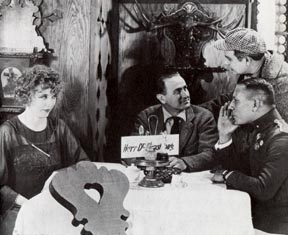 his wife and Lt. Von Steuben all
arrive together at the inn in the Tyrolean Alps, we are witness
to all of the lieutenant's lustful looks, presumptuous overtures
toward Mrs. Armstrong and his lustful plotting. On the carriage,
we see him mesmerized by her exposed ankle while he displays a
wicked smile. When she walks outside the inn to sit in a chair
and read, he quickly secures her a pillow for her back, a stool
for her feet and a cover for her legs, and in his obviously very
forward manner, pulls up a chair beside her and places his arm
around the back of her chair. He leaves edelweiss in her shoes
outside her door. He buys her an expensive jewel box she admired
at the market. All the while, it is obvious that Dr. Armstrong
is neglecting his wife, and she is hurt by his inattention. To
add to the hurt, a young couple is honeymooning at the inn, and
their constant lovemaking makes her wish for the same attentions
from her husband. Von Steuben's blatant overtures are also cause
for tension. The viewer can't help but wonder when the doctor
is going to notice, if he'll catch them in some compromising position
and what he will do.
his wife and Lt. Von Steuben all
arrive together at the inn in the Tyrolean Alps, we are witness
to all of the lieutenant's lustful looks, presumptuous overtures
toward Mrs. Armstrong and his lustful plotting. On the carriage,
we see him mesmerized by her exposed ankle while he displays a
wicked smile. When she walks outside the inn to sit in a chair
and read, he quickly secures her a pillow for her back, a stool
for her feet and a cover for her legs, and in his obviously very
forward manner, pulls up a chair beside her and places his arm
around the back of her chair. He leaves edelweiss in her shoes
outside her door. He buys her an expensive jewel box she admired
at the market. All the while, it is obvious that Dr. Armstrong
is neglecting his wife, and she is hurt by his inattention. To
add to the hurt, a young couple is honeymooning at the inn, and
their constant lovemaking makes her wish for the same attentions
from her husband. Von Steuben's blatant overtures are also cause
for tension. The viewer can't help but wonder when the doctor
is going to notice, if he'll catch them in some compromising position
and what he will do.
One of the most entrancing parts of the script has Mrs. Armstrong sitting at her dressing table in her nightgown. Von Steuben has purchased the jewel box she admired in the market and is delivering it to her door while the doctor is out. Since she is not dressed properly, she grabs her robe but only holds it in front of her, not putting it on. She stands behind the door and tells Von Steuben to hand it to her as she opens the door only far enough to slip the box through. Suddenly, someone is heard on the stairs, and she allows him to come in the room and shut the door. He stands behind her grinning as he admires her bare shoulder. Will they be caught by someone? Will the doctor return before Von Steuben leaves the room since he seems to be so reckless in this regard? Will he succeed in seducing her? Although she puts her robe on quickly, he almost forces himself on her (backing her toward the bed, of course) until she says, "I promise." Von Stroheim wisely leaves us guessing what the "promise" is, but it is enough for him to steal a kiss and, smiling at his "conquest," leave. Laurence Reid in Motion Picture News said, "The action is intensity itself and the suspense is at times overpowering -- especially when the husband and the lover make the ascent of the Pinnacle. One instinctively feels some impending tragedy."
There is real emotion to the script, and, certainly, as the author of this story, Von Stroheim deserves credit.
As director, it is left to conjecture whether someone else could have done as well or maybe even better. It would be safe to assume that this story, which Von Stroheim has dreamed about filming for three years, was so much a part of him that no one else could have done it justice. Although it did go over budget, the film was made on a relatively small budget compared to other Universal features of the time, and filming was completed in three months (one source said seven weeks). This seems to indicate that Von Stroheim could have been a successful director without the extravagances for which he is known on later films and which eventually caused him to be ostracized by producers. In the November, 1927, issue of Theatre Magazine, Von Stroheim opined, almost laughably, "How can a director be expected to turn out an artistic work if he is ever conscious of money? . . . A director should no more be limited to the time and money spent on a picture than an author or a playwright." These are noble artistic sentiments, but not realistic in the business world -- that's why it's called "the motion picture industry."
Von Stroheim pretty much personified what we envision when
we think of a Prussian or Austrian officer. Therefore, if "Blind
Husbands" calls for a Austrian officer, Von Stroheim should
be perfect for the role. Not so. The story also calls for an Austrian
officer who is a ladies' man, someone who can believably seduce
Mrs. Armstrong, not only with his gallant attentions, but also
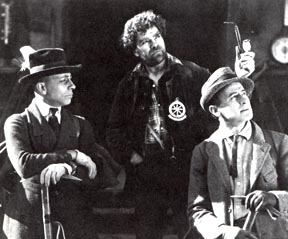 his appearance, his looks, his
physical attractiveness. Von Stroheim is a slight man, particularly
alongside Sam De Grasse, and it's a "stretch" to accept
him as a handsome charmer of the ladies. Take, for example, the
dream that Mrs. Armstrong has of Von Steuben. We see only his
face outlined by darkness as he comes closer to the camera, grinning,
with a huge scar down his forehead. The image is somewhat repulsive,
not seductive. It is difficult to imagine Von Stroheim/Von Steuben
eliciting the interest of a beautiful woman such as Mrs. Armstrong
regardless of his gallantry, poise, polished uniform, beguiling
words or whatever. Variety's reviewer felt Von Stroheim
made his character ridiculous. " . . . we think Stroheim
made his one mistake in his own exceedingly sharp cut impersonation.
It's bad business to make a lover ridiculous." However, there
is one characteristic which Von Stroheim brought to the role that
may be more important to the story than any of these mentioned
above -- he is despicable -- and this quality is what makes the
ending of the story work so well.
his appearance, his looks, his
physical attractiveness. Von Stroheim is a slight man, particularly
alongside Sam De Grasse, and it's a "stretch" to accept
him as a handsome charmer of the ladies. Take, for example, the
dream that Mrs. Armstrong has of Von Steuben. We see only his
face outlined by darkness as he comes closer to the camera, grinning,
with a huge scar down his forehead. The image is somewhat repulsive,
not seductive. It is difficult to imagine Von Stroheim/Von Steuben
eliciting the interest of a beautiful woman such as Mrs. Armstrong
regardless of his gallantry, poise, polished uniform, beguiling
words or whatever. Variety's reviewer felt Von Stroheim
made his character ridiculous. " . . . we think Stroheim
made his one mistake in his own exceedingly sharp cut impersonation.
It's bad business to make a lover ridiculous." However, there
is one characteristic which Von Stroheim brought to the role that
may be more important to the story than any of these mentioned
above -- he is despicable -- and this quality is what makes the
ending of the story work so well.
Sam De Grasse is excellent in the role of Dr. Armstrong. He appears to be older than his wife, but not excessively so. This means we aren't treated to the tired old scenario where the very young, beautiful girl is mismatched with a much older man, therefore we sympathize with her giving in to the attentions of a younger man. No, De Grasse is believable as Billington's husband bringing dignity to the demeanor of Dr. Armstrong yet eliciting ample emotion when called upon in the scene on the mountaintop with Von Steuben. De Grasse was already a veteran of over 30 films by the time he made "Blind Husbands," beginning with "The Birth of a Nation" and most often being found as a villain. Douglas Fairbanks used him several times beginning with "The Half Breed" in 1916 on through "The Black Pirate" in 1926.
Francelia Billington is not one of the most familiar names of the silent era, but she was a perfect choice for the role of Mrs. Armstrong and handles the duties commendably. We are first struck by her beauty as she arrives on the carriage and can understand why Von Steuben is enamored by her. She uses facial expressions and gestures judiciously, never overacting, and always maintains the reserved and dignified demeanor we would expect of Mrs. Armstrong. Billington's smile is charming, and she uses it beguilingly in dealing with von Steuben. The scene in her bedroom when Von Steuben barges in is handled superbly without excessive grimaces and looks of abject fear. When her husband is being brought down the mountain, unconscious, the acting is realistic bringing forth compassion from the viewer. Billington was also a veteran at this time with over 20 films to her credit. It is hard to imagine why she didn't become a bigger star during the silent era. She certainly had both the beauty and the talent for it.
Reportedly, Von Stroheim was granted a half hour with Carl
Laemmle to pitch his story, but after a much longer time came
out with a contract to direct and star in the film. Of course,
he also agreed to provide his beloved "masterpiece"
at no cost, direct it 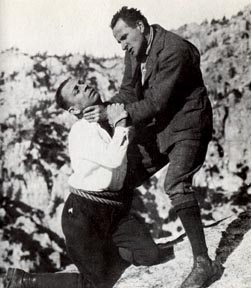 for no salary, and
act for only $200 a week, but the finished product was a smashing
success. Laemmle deserves credit, too, for seeing the possibilities
not only in the script, but in Von Stroheim, as well. I.G. Edmonds
in The Big U: Universal in the Silent Days (A.S. Barnes
and Company, 1977) claims that Laemmle "paid scant attention
to the script or the story as Von Stroheim told it. Von Stroheim
was accepted solely because he spoke German to Uncle Carl."
He goes on to say, "Big U officials were flabbergasted. They
had seen the script. In their eyes, it was impossible, and Von
Stroheim with his arrogant manner was worse in person than his
script."
for no salary, and
act for only $200 a week, but the finished product was a smashing
success. Laemmle deserves credit, too, for seeing the possibilities
not only in the script, but in Von Stroheim, as well. I.G. Edmonds
in The Big U: Universal in the Silent Days (A.S. Barnes
and Company, 1977) claims that Laemmle "paid scant attention
to the script or the story as Von Stroheim told it. Von Stroheim
was accepted solely because he spoke German to Uncle Carl."
He goes on to say, "Big U officials were flabbergasted. They
had seen the script. In their eyes, it was impossible, and Von
Stroheim with his arrogant manner was worse in person than his
script."
However, when Laemmle saw the finished film, he was ecstatic, except for one thing -- the title. Von Stroheim's title was "The Pinnacle." Laemmle said it was too much like "pinochle" and suggested it should be changed. Although Von Stroheim was furious, "The Pinnacle" was discarded in favor of "Blind Husbands" after Laemmle polled exhibitors to back him up. In the end, it proved to be Laemmle's greatest success up to that time bringing in $328,000 in its initial year of release, six times that of a normal Universal feature.
Historian William K. Everson said "Blind Husbands" "was strong material with an inherently sexual theme, yet also with a framework of melodrama that appealed to popular tastes."
The New York Times (December 8, 1919) reviewer praised Von Stroheim's direction. " . . . its outstanding pictorial quality indicates that Mr. Stroheim, unlike many directors, grasps the fact that the screen is the place for moving pictures and that whatever is to be done on it with artistic finish, must be done pictorially. So many directors use moving pictures chiefly to ornament and enliven their stories. They do not depend upon them in crises. Whenever dramatic moments come, or when plot is to be unfolded or carried forward, they turn to familiar but ineffectual words." He went on to say that although the story "is not especially original in plot, and weakened somewhat by its resort to the well-worn theatrical trick of withholding important information from the spectators, (it) is interesting throughout and at times supremely compelling."
The copy reviewed is Kino's DVD with original piano score by Donald Sosin. The print quality is superb, and Sosin's score, derived from the original 1919 cue sheets, is excellent. As an added bonus, the DVD also include's Von Stroheim's 1929 film "The Great Gabbo."